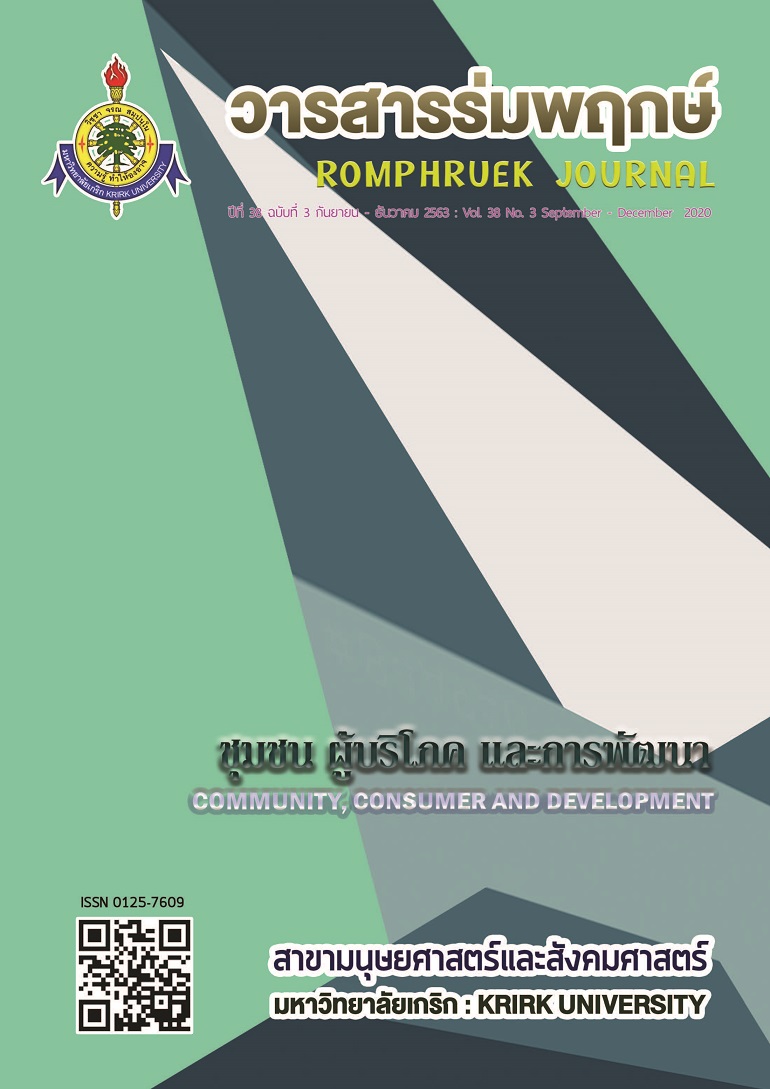กระบวนการติดตั้งระบบและกลไกในการป้องกันและแก้ไขปัญหาคอร์รัปชันโดยการมีส่วนร่วมของชุมชน : กรณีศึกษาชุมชนบางบัว เขตบางเขน และชุมชนหลังแฟลตร่วมพัฒนา เขตหลักสี่ กรุงเทพมหานคร
Main Article Content
บทคัดย่อ
การศึกษา “กระบวนการติดตั้งระบบและกลไกในการป้องกันและแก้ไขปัญหาคอร์รัปชัน โดยการมีส่วนร่วมของชุมชน : กรณีศึกษาชุมชนบางบัว เขตบางเขน และชุมชนหลังแฟลตร่วมพัฒนา เขตหลักสี่ กรุงเทพมหานคร” ให้ความสำคัญกับการมีส่วนร่วมของชุมชนในการติดตั้งระบบและกลไกในการป้องกันและแก้ไขปัญหาคอร์รัปชัน โดยผ่านกติกาชุมชนที่สมาชิกชุมชนร่วมกันกำหนด เพื่อให้ชุมชนใช้เป็นแนวปฏิบัติอย่างสม่ำเสมอและต่อเนื่อง โดยมีวัตถุประสงค์เพื่อติดตั้งระบบและกลไกในการป้องกันและแก้ไขปัญหาคอร์รัปชัน รวมถึงการพัฒนากลไกหนุนเสริมในการขับเคลื่อนในการป้องกันและแก้ไขปัญหาคอร์รัปชันดังกล่าว โดยเน้นกระบวนการมีส่วนร่วมของชุมชนอย่างแท้จริง เพื่อพัฒนาเป็นชุดความรู้ “ชุมชนต้านคอร์รัปชัน” และสร้างวัฒนธรรมการทำงานของคณะกรรมการชุมชนโดยยึดหลักธรรมาภิบาลอย่างน้อย 4 ด้าน คือ หลักการมีส่วนร่วม (Participation) หลักความโปร่งใสและตรวจสอบได้ (Transparency) หลักนิติธรรม (Rule of law) และหลักความรับผิดชอบ (Accountability) ให้อยู่ในวิถีชุมชนโดยให้ความสำคัญกับเยาวชนรุ่นใหม่
ผลการวิจัย พบว่า การติดตั้งระบบและกลไกในการป้องกันและแก้ไขปัญหาคอร์รัปชันโดยการมีส่วนร่วมของชุมชน ผ่านกติกาชุมชนที่ได้ร่วมกันกำหนดเพื่อการทำงานของคณะกรรมการชุมชนประกอบด้วย 7 ประเด็น ได้แก่ 1) การประชุมและองค์ประชุมของคณะกรรมการชุมชน 2) การเงินและแบบฟอร์มทางการเงินของชุมชน 3) การรับสิ่งของบริจาคของคณะกรรมการชุมชน 4) การเปิดโอกาสให้สมาชิกชุมชน โดยเฉพาะเยาวชนคนรุ่นใหม่ มีส่วนร่วมในกิจกรรมของชุมชน 5) การสื่อสารและการเปิดเผยข้อมูลแก่สมาชิกชุมชน 6) กระบวนการหนุนเสริมเพื่อการต้านคอร์รัปชันในชุมชน และ 7) กระบวนการทำงานเพื่อให้เกิดการมีส่วนร่วมกับภาคีเครือข่ายภายนอก
ทั้งนี้ จากการทดลองปฏิบัติการในช่วงระยะที่ดำเนินการวิจัย ทีมวิจัย พบว่า มีการเปลี่ยนแปลงทัศนคติและพฤติกรรมของทั้งสองชุมชนใน 3 ระดับ ด้วยกัน คือ ระดับบุคคล ระดับกลุ่มบุคคล และระดับชุมชน โดยการติดตั้งระบบและกลไกดังกล่าวจำเป็นต้องใช้เวลาในการหล่อหลอมและฟูมฟักเพื่อเรียนรู้ ปรับเปลี่ยนทัศนคติและพฤติกรรมของสมาชิกชุมชนโดยเฉพาะเยาวชนคนรุ่นใหม่ และยังต้องอาศัยความเข้มแข็งเอาจริงเอาจังของประธานชุมชน คณะกรรมการชุมชน และสมาชิกชุมชน ที่จะต้องร่วมมือกันจริงจังในการป้องกันและแก้ไขปัญหาการทุจริตคอร์รัปชัน ซึ่งการเปลี่ยนแปลงนี้นับเป็นทิศทางที่ดีในการสร้างพลังชุมชนสู่การเป็นชุมชนเข้มแข็งเพื่อร่วมกันป้องกันและแก้ไขปัญหาการทุจริตคอร์รัปชันที่จะค่อยๆ ลดและหมดไปสู่วิถี “ชุมชนปลอดคอร์รัปชัน” ในที่สุด
Article Details
ทุกบทความที่ตีพิมพ์ในวารสารมนุษยศาสตร์และสังคมศาสตร์ร่มพฤกษ์เป็นทัศนะและข้อคิดเห็นของผู้เขียนมิใช่ทัศนะของมหาวิทยาลัยเกริกหรือกองบรรณาธิการ การนำบทความส่วนใดส่วนหนึ่งหรือทั้งหมดไปพิมพ์เผยแพร่ต้องอ้างอิงที่มาให้ชัดเจน
เอกสารอ้างอิง
นันธิดา จันทร์ศิริ. (2558). ธรรมาภิบาลระดับท้องถิ่น : มุมมองด้านการมีส่วนร่วมของประชาชนในการจัดการท้องถิ่น. วารสารมนุษยศาสตร์และสังคมศาสตร์ มหาวิทยาลัยราชภัฏสุราษฎร์ธานี, 7(2), 95-118.
ระเบียบกรุงเทพมหานครว่าด้วยค่าใช้จ่ายเกี่ยวกับการสนับสนุนการพัฒนาชุมชน พ.ศ.2554. ราชกิจจานุเบกษา, 128 ตอนพิเศษ 135 ง, 5-6.
สภาที่ปรึกษาเศรษฐกิจและสังคมแห่งชาติ. (2548). รูปแบบและปัจจัยในการเสริมสร้างความเข้มแข็งของชุมชน. (8 มีนาคม 2563) สืบค้นจาก https://www.ryt9.com/s/ryt9/24428.
สำนักงานนโยบายและแผนทรัพยากรธรรมชาติและสิ่งแวดล้อม กระทรวงทรัพยากรธรรมชาติและสิ่งแวดล้อม. (2562). ข้อมูลชุมชนแออัด กรุงเทพมหานคร. (8 มีนาคม 2563) สืบค้นจาก http://www.onep.go.th/.
ศิริวรรณ มนอัตระผดุง. (2555). ปัญหาการคอร์รัปชั่นของไทยกรณีศึกษาสิงคโปร์และฮ่องกง. วารสารสำนักวิชาการสำนักงานเลขาธิการวุฒิสภา, 2(5), 1-22.
อมรรัตน์ กุลสุจริต เพ็ญประภา ภัทรานุกรม สุจิตรา สามัคคีธรรม ปรีชา ปิยจันทร์ และ หฤทัย กมลศิริสกุล. (2560). แนวทางการพัฒนาระบบและกลไกเพื่อพัฒนาชุมชนให้เป็นสังคมที่ปลอดคอร์รัปชันโดยการมีส่วนร่วมของชุมชน : กรณีศึกษาชุมชนในเขตบางเขน เขตสายไหม เขตดอนเมือง และเขตหลักสี่ กรุงเทพมหานคร. สำนักงานกองทุนสนับสนุนการวิจัย (สกว.).
อรทัย เลียงจินดาถาวร และคณะ. (2559). รูปแบบการบริหารจัดการงานวิจัยเพื่อการหนุนเสริมงานวิจัยเพื่อท้องถิ่นของมหาวิทยาลัยอุบลราชธานี. วารสารวิจัยเพื่อการพัฒนาเชิงพื้นที่, 8(4), 15-34.
TRANSPARENCY.ORG. (2020). Corruption Perceptions Index : CPI. 2017-2019. (15 March 2563) สืบค้นจาก www.transparency.org.
Creighton. (2005). The public participation Handbook : Making Better Decisions Through Citizen Involvement. San Francisco : Jossey – Bass.
Votava, Cari. (2018). Corruption Main Cause of Poverty, Daily Observer. (10 March 2020) Retrieved from https://www.Liberian observer.com/news/corruption-main-cause-of-poverty-says-orld-bank-official/.


